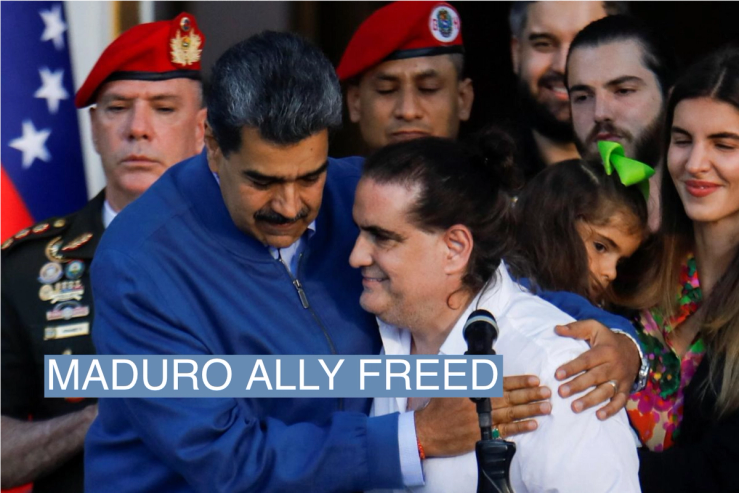The News
The U.S. freed a close ally of Venezuelan President Nicolás Maduro in exchange for 10 detained American citizens and a Malaysian fugitive wanted over a Pentagon bribery scandal.
Some of the American detainees arrived back on U.S. soil on Wednesday after months of negotiations brokered by Qatar. The deal will also see Venezuela release 21 political prisoners.
SIGNALS
A surprise homecoming for Maduro ally Alex Saab
The return of Alex Saab, a Colombian businessman who is a close confidant of the Venezuelan president, marks a victory for Maduro, Reuters reported. Saab was extradited to the U.S. in 2021 and held in Miami after being charged with siphoning $350 million out of Venezuela as part of a bribery scheme. Caracas-based political pundit Luis Vicente León described the prisoner swap as a win for both Biden and the Chavismo movement for The Guardian, as it showed that Maduro is determined “not to abandon his own people.”
The exchange was criticized in both countries. U.S. Senator Marco Rubio (R-FL) called Saab’s release “shameless,” arguing that a concessions approach to Maduro was “doomed to fail.” In Venezuela, a congressman wrote on X: “I don’t know if Saab’s release brings us closer to freedom. But I have no doubt that it sets us further apart from justice.” Former U.S. Treasury adviser Marshall Billingslea noted that the release sends a “disastrous signal to partner nations” and is a “gut-punch” to the Venezuelan opposition.
The release of “Fat Leonard”, a defense contractor who bribed the U.S. Navy, could help with ongoing case prosecution
The most notable prisoner returned to the U.S. was Leonard Francis, known as “Fat Leonard,” who pleaded guilty to being at the center of a sprawling U.S. Navy corruption ring in 2015. The Malaysian businessman and military contractor, who fled house arrest and escaped to Venezuela last year, now faces sentencing for corruption. Previously, it was widely expected that his 25-year plea sentence would be reduced due to his cooperation with prosecutors as a “star witness.” Vanessa Romo of NPR said that this leniency “is likely non-existent after embarrassing the U.S. government.” His return may add more legitimacy to a trial that has been fraught with setbacks in the U.S. court system, with “flagrant and outrageous” misconduct allegations against the prosecutors during the naval officer trial process.
Biden gambles for democratic elections in Venezuela
The Biden administration commended Venezuela’s recent commitment to hold competitive presidential elections in 2024 as it announced the prisoner swap deal, calling Caracas’ electoral roadmap “a positive and important step forward.” But many commentators have questioned Venezuela’s commitment. In El País, journalist Luz Mely Reyes called this agreement “one of the stalling tactics that are commonly deployed by the Chavista regime.” And the government’s recent move to annul the primary election of a challenger to Maduro has also raised concerns. Political analyst Pedro Benítez told The New York Times that the move was the “first phase” of a “direct offensive” against democratic electoral processes.



